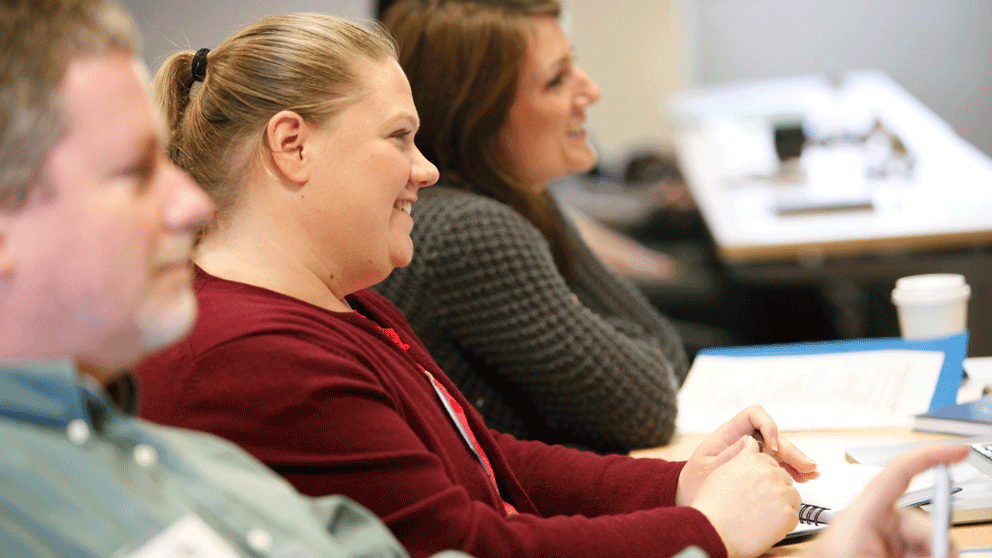Lisa John was troubled.
John, program director of the predoctoral and postdoctoral education programs at The Jackson Laboratory (JAX), had made sure that the early-stage researchers in her programs received excellent research training. Nonetheless, many of them still lacked crucial skills when they sought to begin their independent scientific careers.
“There’s a pressing need to include professional training beyond the traditional academic courses and research programs,” says John. “There are subject areas – communications, teaching, management, entrepreneurship – that are pretty much ignored in science education and training but are integral for success in our complex science culture these days.”
A hypercompetitive environment
Broader training is of critical importance in today’s research climate. Recent estimates indicate that as few as one in 10 life science Ph.D. recipients will go on to an academic research appointment, the traditional end goal. And while there are many other career tracks available to these scientists, most of them demand abilities that go beyond bench research skills.
A recent paper in the Proceedings of the National Academy of Sciences brought renewed attention to the situation. Top researchers Bruce Alberts, Marc Kirschner, Shirley Tilghman and Harold Varmus decried what they termed the “hypercompetitive” landscape in biomedical research:
“Fundamentally, the current system is in perpetual disequilibrium, because it will inevitably generate an ever-increasing supply of scientists vying for a finite set of research resources and employment opportunities. The resulting strains have diminished the attraction of our profession for many scientists – novice and experienced alike.”
In such a situation, every skill and competitive advantage benefits researchers. And that’s the thinking behind The Whole Scientist Program, a new curriculum John helped to develop at JAX.
The Whole Scientist
The Whole Scientist brings trainees, mostly postdoctoral fellows, off the bench (and perhaps out of their comfort zones) for skills training designed to be useful no matter where their path might lead. The specific curriculum includes communications, budgeting, teaching, entrepreneurship, ethics and career development, but the goals of the program go beyond specific subject areas.
“We’re implementing a new approach that better prepares trainees for modern research and scientific leadership positions,” says John.
John and others at JAX implemented the pilot Whole Scientist course in May 2013 in Bar Harbor, providing a four-day series of lectures and discussions for JAX trainees. Following the successful pilot, John spearheaded the program’s expansion into a multi-site course well supported with grant funding in 2015. This year’s version includes students from outside JAX as well as organized practicums, during which students work with real-world material presented by professionals in the various fields. For example, this fall students are training with a scientific writer on research communications and with grants administrators on pre- and post-grant award budgeting.
A long road
Becoming a researcher in the life sciences is a rigorous process. Undergraduates hit the books, getting a taste of bench work in the laboratory along the way. Graduate students start with fewer classes and more time in the lab, gradually transitioning to what amounts to full time on the bench with dissertation prep added on top. Postdoctoral trainees typically work long hours almost exclusively in the lab, preparing for a career in academic bench science. But as previously discussed, the large majority of trainees now move on to different careers.
Even for researchers who are able to land a coveted academic appointment, the funding situation is so tight that grant writing and budgeting skills can contribute more to building a successful lab than expertise in any particular research methodology. And of course, understanding of such things as communications and budgeting is demanded—and often taken for granted—in industry and other career tracks. Few research programs provide effective training in those areas, however, leaving many early career scientists floundering.
“It’s not common for a postdoc to be asked ‘what is your 10-year plan?’” says Associate Research Scientist Beth Snyder, Ph.D., who recently completed a postdoctoral fellowship at JAX and is participating in The Whole Scientist program. “The Whole Scientist asks that and forces trainees to reflect and figure out how to get the training they need to reach their goals. It’s a unique program that moves well beyond what the normal training program looks like.”

Awareness
While time for trainees is limited for in-depth exploration, The Whole Scientist provides students with needed information and skill training in a range of important subjects. It also provides two things perhaps even more valuable: awareness and a good starting point.
Snyder is currently pursuing an academic faculty position, and deems The Whole Scientist “incredibly useful” for her next steps. “The Whole Scientist brings experts together from many different areas and makes them accessible to trainees,” says Snyder. “It makes it much easier to leverage their collective experiences and perspectives. As an example, teaching is deemphasized in most postdoc programs, but I’m finding that faculty applications ask questions about your teaching. It’s very helpful for me to have spoken with Whole Scientist instructors and to have learned about active learning techniques, and other educational methods and insights. ”